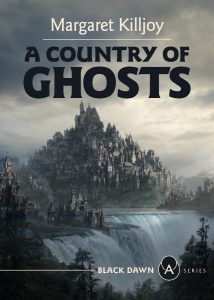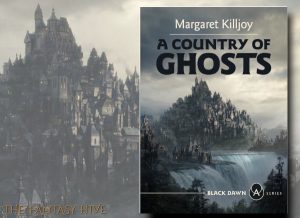A COUNTRY OF GHOSTS by Margaret Killjoy (BOOK REVIEW)
“Hron’s a country, I guess,” Sorros said, “in that we’re a collection of people with a somewhat-shared culture who commonly defend certain rough borders and principles. But we’re not a country like Vorronia or Borolia or even the Floating Isles. We don’t have a king of a parliament or a council or a royal priesthood or trade barons or capitalists or really any of the vestiges of power at all. We’re a country, but we’re an anarchist country.”
“What does that mean?” I asked.
“It means that everyone in Hron is the master of their own destiny,” Sorros said. “It means that there are no laws here, no prisons.”
Dory chimed in. “The free Confederation of Hron is a voluntary association of autonomous groups and individuals who cooperate to provide on another mutual aid,” Dory said.
“Yeah, that mouthful right there. That’s Hron. We’re people who have each other’s backs because having someone’s back means someone has yours, and that’s a good way to live.”
Margaret Killjoy’s A Country Of Ghosts is a remarkable book, one that demonstrates the power of speculative fiction and Fantasy as a tool to imagine new ways of living outside of repressive regimes. It’s customary for lazy Fantasy reviewers to compare any vaguely political work of SF or Fantasy by a woman writer to Ursula K. Le Guin, but in this case, Killjoy’s novel is a genuine successor to Le Guin’s exploration of an anarchist, anticapitalist society in The Dispossessed (1974). A Country Of Ghosts imagines a character from an imperial colonising power coming into contact with an anarchist society in a secondary fantasy world in the 19th century, and from this Killjoy explores with eloquence, warmth and humanity how a utopian society might organise itself in a way radically different to ours. Originally published by Combustion Books in 2014, A Country Of Ghosts is republished this year by AK Press as the first book in their Black Dawn series, dedicated to imagining anticapitalist, anticolonialist and antiracist futures in honour of Octavia E. Butler’s works, where it makes an excellent mission statement for the line.
 A Country Of Ghosts tells the story of Dimos Horacki, a journalist from Borol who is sent to the frontlines of the war to report on the exploits of Borolian war hero Dolan Wilder. Travelling with the Imperial Army, Dimos soon experiences the brutality of Wilder and his men, and the violence which they mete out to the small settlements in the Cerrac mountains. When his honest eyewitness report is intercepted by Wilder, he is sent out on a suicide mission and captured by the Free Company of the Mountain Heather. Dimos finds out that the mountains are home to the anarchist country of Hron, and as he befriends the militia and learns about their ways and their culture, he is shown a way of living free from the tyrannical oppression of the Borolian Empire.
A Country Of Ghosts tells the story of Dimos Horacki, a journalist from Borol who is sent to the frontlines of the war to report on the exploits of Borolian war hero Dolan Wilder. Travelling with the Imperial Army, Dimos soon experiences the brutality of Wilder and his men, and the violence which they mete out to the small settlements in the Cerrac mountains. When his honest eyewitness report is intercepted by Wilder, he is sent out on a suicide mission and captured by the Free Company of the Mountain Heather. Dimos finds out that the mountains are home to the anarchist country of Hron, and as he befriends the militia and learns about their ways and their culture, he is shown a way of living free from the tyrannical oppression of the Borolian Empire.
Like many classical utopian texts, we are shown the anarchist utopia of Hron through the eyes of an outsider, which allows us to learn about the society’s culture and organisation as the protagonist learns about them. Dimos is an excellent character for this. As a political journalist, a gay man, and an orphan brought up by the state, Dimos has a nuanced understanding of the various layers of oppression that shape Borol. The Borolian Empire is loosely based on the British Empire, and its methods of colonialist expansion, its use of violence and its erasure of indigenous cultures, and its reduction of its own people to a privileged upper class and a starving, downtrodden working class are all too familiar. Dimos may have a healthy cynicism about the Borolian Empire which makes him willing to listen to his new friends he meets in Hron, especially after he has seen first-hand the atrocities committed by the Imperial Army, but he still has many questions about how society in Hron works. As he journeys across the Cerrac mountains, he learns some answers to these questions from the various characters he meets and interacts with: Sorros Ralm, the militia man who first befriends him, Nola, his partner and a woman with a brilliant military mind, Grem, Dory, Joslek and Desil, the younger members of Mountain Heather that he spends his time with.
What makes A Country Of Ghosts so compelling is that Dimos’ lessons are not imparted simply through discussion with other characters, although there is plenty of that. Killjoy skilfully makes her arguments by letting her characters lead by example. The novel is excellent social science fiction, imagining various different ways people might approach living in an anarchist society. Through Dimos, we get to see first-hand how the Free Companies are able to organise themselves without having to resort to hierarchical chains of command. Each settlement in Hron, from the villages of Holl and Molikari to the great refugee city of Hronople, have their own particular way of self-organising, that is built around freedom, cooperation and mutual respect. In contrast to the poverty and violence in Borol, the people of Hron have found a way to live outside of the rigid restrictions of capitalism and empire. Killjoy explores how a society might operate that respects personal autonomy, yet is still able to functionally come together to defend itself and in which there are no laws but there are still consequences that prevent murder and violence. Additionally, these freedoms allow the people of Hron to exist free from the racist, colonialist attitudes of the Borolian Empire, with people interacting on a more personal level. Dimos finds that, as a queer person, he enjoys much more freedom with the Hron to explore his sexuality and to be with other people than he ever had at home in Borol, and the difference between how the various people he encounter treat foreigners compared to the brutal violence the people of the Cerrac mountains receive at the hands of the Imperial Army is striking.
A Country Of Ghosts works both as an exploration of anarchy and as literature. Killjoy’s writing is thoughtful and elegant, and the story is structured around various armed conflicts between the Free Companies and the Imperial Army, creating plenty of action and tension to keep the reader invested. Killjoy’s characters are human and believable, and she does not resort to short cuts or easy answers to hammer home her political arguments. It is a novel that will stay with me for a long while, and I look forward to reading more of Killjoy’s work and seeing where AK Press take their Black Dawn series from here.


[…] Jonathan’s Recommendation: A Country of Ghosts by Margaret Killjoy […]
[…] Thanks to Jonathan Thornton at The Fantasy Hive A Country of Ghosts by Margaret Killjoy is definitel…. But then pretty much anything Jonathan recommends immediately goes on my list. […]